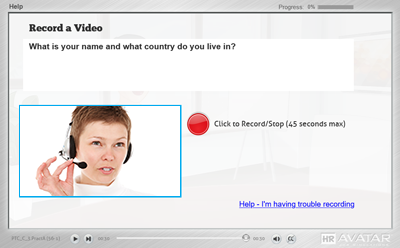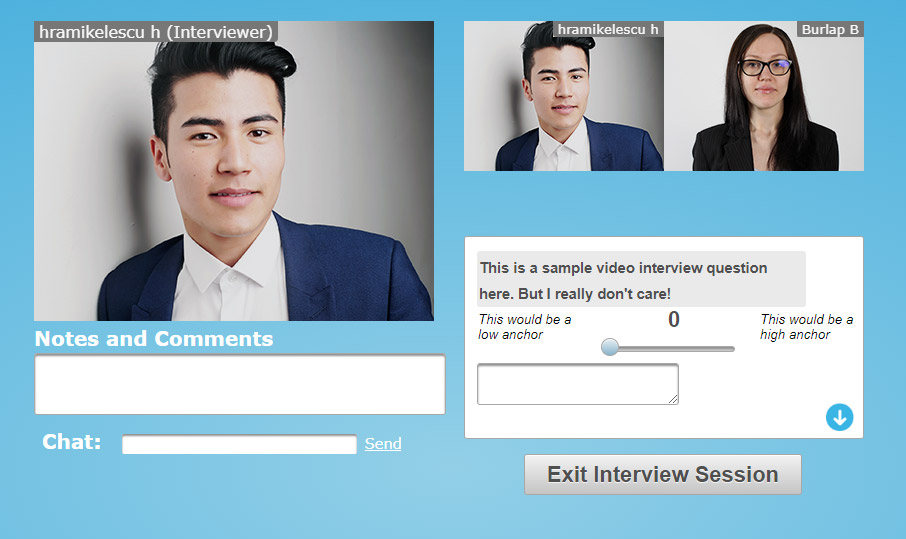 You've probably heard some recent buzz regarding video interviewing. Since video chat on the Internet has been around since at least 2003 (Skype release) and companies dedicated to pre-employment video interviewing have been around since 2010, you might be wondering what's new - and why you should care.
You've probably heard some recent buzz regarding video interviewing. Since video chat on the Internet has been around since at least 2003 (Skype release) and companies dedicated to pre-employment video interviewing have been around since 2010, you might be wondering what's new - and why you should care.
Change 1: No more apps to install
Think of the mainstream video chat products out there: Skype, FaceTime, WhatsApp, Facebook, etc. They all require that you download and install an app.
While installing an app is no big deal if you are communicating regularly with friends and family, it's a different story for conducting interviews. When you just want to talk for a few minutes, installing a special app is kind of a big ask. That has changed, however.
App-free video chat through the web browser has been enabled through a technology called WebRTC. Recently, WebRTC has reached a critical level of maturity and adoption across web browsers. So now, beginning a video interview call is as simple as going to a website.
Change 2: Arrival of artificial intelligence-driven services
The arrival of reliable and affordable artificial intelligence allows customized applications to perform several key functions that can make a tangible contribution to the overall utility of the interview. These include:
- Speech-to-text - to store searchable transcripts of calls.
- Text translation - to convert to different languages.
- Voice analysis - to determine how the candidate comes across to others.
- Personality evaluation - based solely on the candidates responses.
So that's what changed: no more apps and the widespread availability of key AI-driven services.
Types of video interviews
Before we get to the why part of this entry, I want to describe the two types of pre-employment video interviewing:
- Recorded (or virtual)
- Live
In a recorded or 'virtual' video interview, the candidate records video answers to one or more pre-configured questions. The recruiter or hiring manager can play these responses back at their convenience.
 In a live video interview, both candidate and recruiter are connected in a video chat so they can talk to one another directly.
In a live video interview, both candidate and recruiter are connected in a video chat so they can talk to one another directly.
The advantages of recorded video interviews are convenience and time efficiency for both the candidate and the interviewer. There is no scheduling required, and each can participate at a time of their choosing. Additionally, recruiters can skip or fast forward through responses, saving themselves some time on low-value candidates. A final advantage is that the system will ask all questions in a completely consistent manner, treating all candidates the same.
The advantage of live video interviews is that the interviewer can probe selectively on areas of interest or concern, just like they would in an in-person interview. Additionally, a live video interview saves the recruiter logistical time in traveling to meetings, increasing efficiency.
Why should you care about video interviews?
There are several key benefits:
- Convenience
- Efficiency
- Quality of Hire
- Fairness and defense-ability
Let's discuss each of these for a bit.
Convenience
For recorded video interviews, candidates record their responses at their convenience. There is no scheduling needed.
For live video interviews, the recruiter and candidate can both conduct the interview from a location convenient to them. No travel costs. No travel time.
Efficiency
Most recruiters care a lot about efficiency, and video interviews provide a major efficiency boost. This has been the primary argument of video interviewing companies since they first started in 2010. Depending on the type of video interviewing you are using, your overall productivity in terms of interviews conducted and candidates processed can get a boost as high as 15 percent.
This efficiency boost is primarily from time savings derived from not having to listen to all videos in a recorded interview, and from not having to leave your desk for a live video interview.
Quality of Hire
This benefit is unquestionably my favorite, since our company is completely dedicated to helping our customers increase their quality of hire. Sure, everyone cares about efficiency. But we should never lose sight of the fact that the main metric for any hiring activity is quality of hire.
So how does a video interview increase your quality of hire? There are two ways:
- By forcing structured interviewing
- By adding unbiased AI-generated data
Interviews in general are the most popular means of evaluating job candidates and making hiring decisions. We can classify interviews as either 'structured' or 'unstructured.' A structured interview is an interview in which the interviewer follows a predetermined interview guide and uses a standardized rubric to score the candidate's responses. Conversely, an unstructured interview does not follow any kind of planned script or questionnaire.
Research studies have shown that the use of structured interviews is about 50% more valid than unstructured interviews. That is A LOT. This makes intuitive sense, since a structured interview is more systematic and repeatable in nature than an unstructured one. A systematic approach to covering the requirements of a job with a candidate is more likely to expose the candidate's weaknesses than a more random approach.
We've known the value of structured interviewing for some time. In fact, the study I referenced above was completed way back in 1988. However, it has been difficult to implement structured interviewing. Hiring managers are too busy, and too hard to control.
But all of this changes with video interviewing. Now you can build an interview guide or script and scoring rubric and make sure it gets used. For 'recorded' video interviews this is particularly easy, since the computer administers the structured interview directly. For live video interviews the interviewer is asked to review the script before they connect. Then they can scroll through the questions and enter scores right below the face of the candidate, on screen and in real time. Finally, they can review their responses and make any adjustments to scores and comments after they disconnect. You can also have multiple interviewers all using the same interview guide and entering scores independently.
Your quality of hire will almost certainly increase through consistent use of the structured questioning features of video interviewing. However, quality of hire may also be enhanced by AI-driven services. For example, if you are hiring customer facing service representatives, you may want to know if their voice comes across as friendly and enthusiastic or as boring and arrogant. AI-driven voice analysis can do that for you. Or, you may want to be sure they have the personality profile you want for your corporate culture. Once again, AI can do that for you.
Fairness and Defense-ability
This one may seem a little counter-intuitive. We've all been trained to develop our hiring process to have the smallest potential for unfair bias that we can achieve. In our efforts to do this we often try to prevent recruiters and hiring managers from 'seeing' what candidates look like until late in the hiring process. However, a video interview exposes what the candidate looks like right away.
So why is video interviewing better for fairness and defense-ability?
First, keep in mind that recruiters can use Facebook or other social media to see what a candidate looks like when they want. It's almost impossible to prevent this. Also, names, writing styles, and voices can be giveaways for race and ethnic background. In other words, you don't need a video interview to inject unfair bias if the recruiter or hiring manager is inclined to do so.
However, because it allows for highly structured interviews from multiple interviewers, all scored objectively and independently, a video interview can actually reduce bias. Also, because a video interview allows you to automatically capture a full text transcript (and sometimes a recorded video record) of the interview, video interviewing provides for auditability from managers as well as a record to be reviewed should there be any challenge.
Let's wrap it up
OK, this blog entry went a little longer than I expected. But there was a lot to cover. What did we learn:
- App-free video interviewing products are here.
- AI-based services create results that are not possible with in-person interviewing
- Video interviews can be either 'recorded' or 'live'
- Benefits of video interviews include:
- Convenience
- Efficiency
- Quality of hire
- Fairness and defense-ability
Current video interviewing offerings offer significant value to recruiters and hiring managers. First - it's easy to do. No more apps to deal with. Second, it's convenient for everyone involved. Third, it delivers efficiency and improved quality of hire. Finally, it can increase fairness and help you defend your process in legally if that is ever necessary.
So, if you care about quality of hire or about efficiency, this may be a good time to look into video interviewing if you haven't already done so. Good luck!